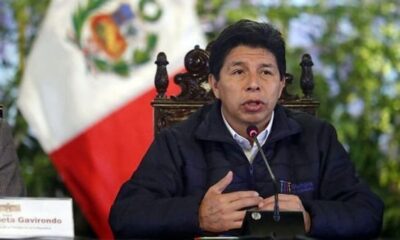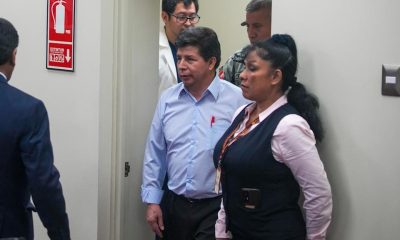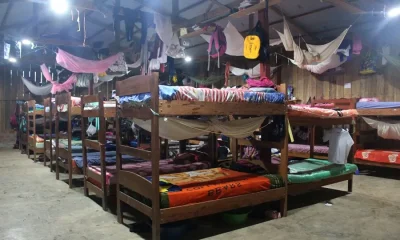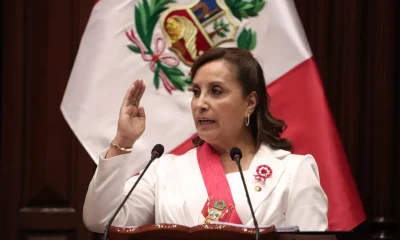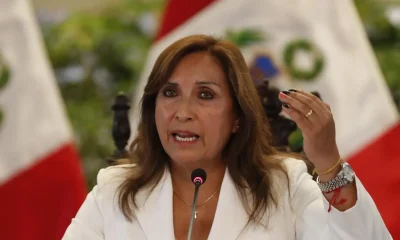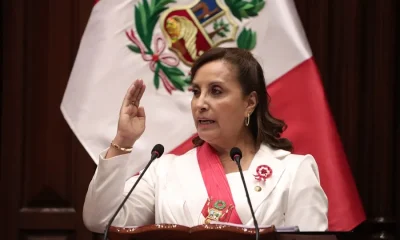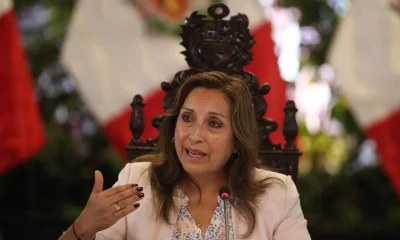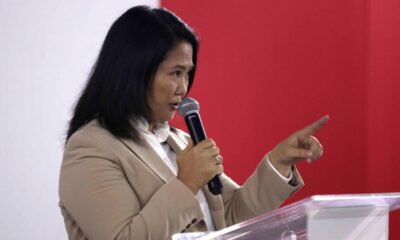International
Social leaders demand resignation of Peruvian Health Minister
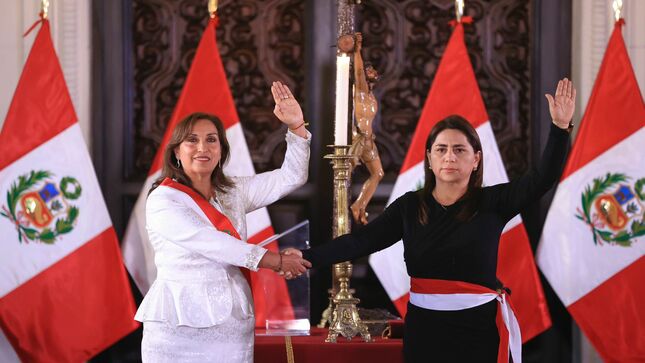
June 1 |
Social leaders in the northern Peruvian city of Piura today demanded the resignation of the Minister of Health, Rosa Gutiérrez, for what they consider to be poor management of the growing number of dengue cases.
Gutierrez’s resignation was demanded at a sit-in in the center of Piura, capital of the region of the same name, which has suffered 40 deaths and 31,000 dengue infections and similar levels of dengue in the neighboring region of Chiclayo and in the southern region of Ica.
Previously, the parliamentarian Edward Malaga, in a letter, asked the minister to resign because she does not have the necessary professional profile for the position, as she is a nephrologist previously dedicated to administrative positions and lacks epidemiological preparation.
One of the demonstrators in the protest called by the Colectivo Regional por la Salud y la Vida accused the minister of inaction and negligence, because in a previous visit, when there were 20 deaths, she said that the outbreak was under control and in decline.
He added that Gutiérrez offended Piura by affirming that the population is to blame for the advance of dengue because they do not comply with the prohibition of having water tanks in their homes, where the Aedes Egypti mosquito, transmitter of the disease, reproduces on a large scale.
The minister is also criticized for claiming that funds have been transferred to the Regional Directorate of Piura to fight dengue, and therefore she is responsible for the situation.
The president of the Medical Federation of Piura (union of state service physicians), María Lupú, supported the protest and stated that the funds allocated are insufficient to hire more physicians and develop preventive actions.
In addition, she indicated that more doctors are needed, since the doctors dealing with dengue fever in Piura are insufficient and each one can attend up to 50 patients per day, which is detrimental to the quality of service.
The president of the Unified National Federation of Health Sector Workers, Wilder Farfán, also joined the demand for the resignation of the head of Health, due to her poor performance.
According to official figures updated to date, 119,533 cases of dengue fever have been registered in Peru since the beginning of the year, including confirmed (60,710) and probable (58,823) cases, 118 patients have died and there are other deaths under investigation.
There are cases in almost all regions and the Ministry of Health maintains that these are only controllable outbreaks, although the Peruvian Medical Federation affirms that it is an epidemic.
International
U.S. Senate Rejects Budget, Bringing Government Closer to Shutdown Amid DHS Dispute

The U.S. Senate voted on Thursday against a budget proposal in a move aimed at pressuring changes at the Department of Homeland Security (DHS), following the killing of two civilians during a deployment of immigration agents in Minneapolis.
All Senate Democrats and seven Republican lawmakers voted against the bill, which requires 60 votes to advance, pushing the country closer to a partial government shutdown that would cut funding for several agencies, including the Pentagon and the Department of Health.
The rejection came as Senate leaders and the White House continue negotiations on a separate funding package for DHS that would allow reforms to the agency. Proposed measures include banning Immigration and Customs Enforcement (ICE) agents from wearing face coverings and requiring them to use body-worn cameras during operations.
The vote took place just hours after President Donald Trump said he was “close” to reaching an agreement with Democrats and did not believe the federal government would face another shutdown, following last year’s record stoppage.
“I don’t think the Democrats want a shutdown either, so we’ll work in a bipartisan way to avoid it. Hopefully, there will be no government shutdown. We’re working on that right now,” Trump said during a Cabinet meeting at the White House.
International
Trump Says Putin Agreed to One-Week Halt in Attacks on Ukraine Amid Extreme Cold

U.S. President Donald Trump said on Thursday that he secured a commitment from Russian President Vladimir Putinto halt attacks against Ukraine for one week, citing extreme weather conditions affecting the region.
“Because of the extreme cold (…) I personally asked Putin not to attack Kyiv or other cities and towns for a week. And he agreed. He was very pleasant,” Trump said during a Cabinet meeting broadcast by the White House.
Trump acknowledged that several advisers had questioned the decision to make the call.
“A lot of people told me not to waste the call because they wouldn’t agree. And he accepted. And we’re very happy they did, because they don’t need missiles hitting their towns and cities,” the president said.
According to Trump, Ukrainian authorities reacted with surprise to the announcement but welcomed the possibility of a temporary ceasefire.
“It’s extraordinarily cold, record cold (…) They say they’ve never experienced cold like this,” he added.
Ukrainian President Volodymyr Zelensky later commented on the announcement, expressing hope that the agreement would be honored.
International
Storm Kristin Kills Five in Portugal, Leaves Nearly 500,000 Without Power

Storm Kristin, which battered Portugal with heavy rain and strong winds early Wednesday, has left at least five people dead, while nearly half a million residents remained without electricity as of Thursday, according to updated figures from authorities.
The revised death toll was confirmed to AFP by a spokesperson for the National Emergency and Civil Protection Authority (ANPEC). On Wednesday, the agency had reported four fatalities.
Meanwhile, E-Redes, the country’s electricity distribution network operator, said that around 450,000 customers were still without power, particularly in central Portugal.
Emergency services responded to approximately 1,500 incidents between midnight and 8:00 a.m. local time on Wednesday, as the storm caused widespread disruptions.
The Portuguese government described Kristin as an “extreme weather event” that inflicted significant damage across several regions of the country. At the height of the storm, as many as 850,000 households and institutions lost electricity during the early hours of Wednesday.
Several municipalities ordered the closure of schools, many of which remained shut on Thursday due to ongoing adverse conditions.
Ricardo Costa, regional deputy commander of the Leiria Fire Brigade, said residents continue to seek assistance as rainfall persists.
“Even though the rain is not extremely intense, it is causing extensive damage to homes,” he noted.
In Figueira da Foz, a coastal city in central Portugal, strong winds toppled a giant Ferris wheel, underscoring the severity of the storm.
-

 International3 days ago
International3 days agoU.S. Senate Rejects Budget, Bringing Government Closer to Shutdown Amid DHS Dispute
-

 International4 days ago
International4 days agoFootball Fan Killed in Clashes After Colombian League Match
-

 Central America4 days ago
Central America4 days agoGuatemala President Says Starlink Terminal Found Inside Prison
-

 International4 days ago
International4 days agoRubio Says U.S. Could Participate in Follow-Up Russia-Ukraine Talks
-

 International4 days ago
International4 days agoMissing Spanish Sailor Rescued After 11 Days Adrift in Mediterranean
-

 Central America2 days ago
Central America2 days agoPanama Supreme Court Strikes Down Panama Ports Concession as Unconstitutional
-

 International3 days ago
International3 days agoStorm Kristin Kills Five in Portugal, Leaves Nearly 500,000 Without Power
-

 Central America2 days ago
Central America2 days agoU.S. and Guatemala Sign Trade Deal Granting Zero Tariffs to Most Exports
-

 International3 days ago
International3 days agoMan Arrested After Vehicle Crashes Into Jewish Institution in Brooklyn
-

 International3 days ago
International3 days agoTrump Says Putin Agreed to One-Week Halt in Attacks on Ukraine Amid Extreme Cold
-

 Central America7 hours ago
Central America7 hours agoCosta Rica Goes to the Polls as Voters Choose Continuity or Change

























